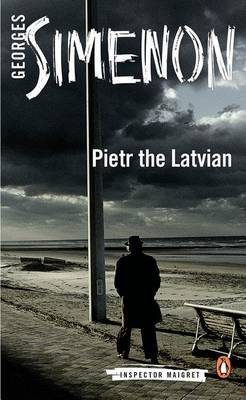
Georges Simenon was inter-war France’s most famous writer of detective fiction, and Inspector Maigret is his most famous creation: built like a rugby player, sucking on his pipe, with the collar of his coat turned up against the Paris drizzle. A few years back, Penguin announced it would be reissuing one Simenon per month – a larger undertaking than it sounds, given the sheer volume of his output, not to mention the need for translation. This week, after years of good intentions, I finally read one of them.
We meet Maigret sitting at his desk, reading telegrams reporting sightings of the titular conman, Pietr the Latvian (actual name and country of origin subject to dispute). Soon a body matching Pietr’s description turns up on a train at the Gare du Nord…but wasn’t that a familiar-looking ear that Maigret saw disappearing into the crowd around the carriage?
This book – I can’t speak to the rest of Simenon’s output, but he usually wrote his novels in a frenzy over the course of a week or so, which doesn’t bode well – is probably best enjoyed by those who like Raymond Chandler but think the language is too flashy. It’s the very definition of hard-boiled, without the redeeming feature of Marlowe’s glorious vernacular. As to plot, I was pretty much lost for most of it: Simenon seems to take it for granted that his readers understand what Maigret’s up to, but I’m a pretty smart lady, and it seemed to me like he was pretty much just standing arbitrarily in the rain for a good two-thirds of the novel, occasionally getting shot for no explicable reason. (All is revealed at the end, but it was mystifying at the time.) It’s also a precondition of enjoying the novel that you will put any feminist leanings aside: Maigret has a wife, but he doesn’t call home for the three or four days over the course of which the novel takes place (despite being SHOT IN THE CHEST), and the whole time she is literally stirring a pot of stew in case he turns up and demands a meal with no notice. That’s not a metaphor.
If you’re into a French noir atmostphere and don’t much care what else comes with it, I can understand why you would enjoy this book, but beyond that I’m honestly baffled about why these books has apparently stood the test of time. Do they get better? Is there something I’m missing? Maybe it’s unfair to stand in judgment after only one. Yet here I am.